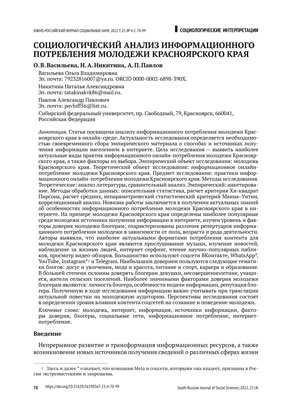Abstract
In the article, we analyze online information consumption by the young people of Krasnoyarsk region. The relevance of the study is determined by the need of the timely accumulation of empirical material on the ways and sources of information obtained by the population on the Internet. The aim of the study is to identify the most relevant types of online information consumption practices of young people in Krasnoyarsk region, as well as the factors of their choice. Research methods. Theoretical: Literature analysis, comparative analysis. Empirical: questionnaire survey. Data processing methods: descriptive statistics, calculation of Pearson Chi-square, calculation of averages, nonparametric Mann-Whitney statistical test, correlation analysis. The novelty of the work lies in obtaining relevant knowledge about the peculiarities of information consumption of young people in Krasnoyarsk region on the Internet. Using the example of young people in Krasnoyarsk region we have identified the most popular information sources on the Internet, and studied the level and factors of young people’s trust in bloggers; differences in the information consumption repertoires of young people according to gender, age, and occupation have been also characterized. The authors found out that the most relevant formats of content consumption for young people in Krasnoyarsk region are listening to music, studying the news, monitoring people’s lives, surfing the Internet, reading popular science publishers, and watching video reviews. The majority of young people use VKontakte, WhatsApp*, YouTube, Instagram* and Telegram social networks. The most trusted blog topics are: leisure and hobbies, fashion and beauty, nutrition and sports, career and education. Female youth, minors, students and residents of rural settlements are more inclined to trust bloggers. The most significant factors in young people’s trust in bloggers are: a blogger’s personality, the particularities of presenting information, and a blogger’s reputation. It is important to consider the information gathered in the research when transmitting the current agenda to youth audiences. The prospects for the research are to identify how much the content of social networks affects the minds and behavior of youth.
* The Meta company and the social networks it owns are recognized as extremist in Russia and banned.
Keywords
References
Айсина, Р.М., Нестерова, А.А. (2019). Киберсоциализация молодежи в информационно-коммуникационном пространстве современного мира: эффекты и риски. Социальная психология и общество, 10(4), 42–57.
Богдановская, И.М., Королева, Н.Н., Углова, А.Б. (2021). Психологические факторы доверия к популярным видеоблогерам у современной молодежи. Психология. Журнал Высшей школы экономики, 3, 451–467.
Бойд, Д. (2020). Все сложно. Жизнь подростков в социальных сетях. Москва: Изд. дом Высшей школы экономики.
Брайант, Д. (2004). Основы воздействия СМИ. Москва: Издательский дом «Вильяме».
Васильченко, В.В. (2015). Формирование протестного политического сознания молодёжи посредством интернет-коммуникаций. Вестник Московского государственного областного университета, 3, 17.
Володенков С.В., Белоконев С.Ю., Суслова А.А. (2021). Особенности структуры информационного потребления современной российской молодежи: на материалах исследования среди студентов-политологов Финансового университета. Вестник Российского университета дружбы народов. Серия: Политология, 1, 31–46. DOI: 10.22363/2313-1438-2021-23-1-31-46
Голикова, И. (2021). Негативное влияние на молодежь цифровой антикультуры в период фейков, постправды на примере сети тик ток. В Сборник научных статей 2‑й Международной научной конференции перспективных разработок молодых ученых «Школа молодых новаторов» (c. 361–367).
Дружба, О.В., Каирова, И.А., Кошман, М.В. (2020). Социальные сети как пространство интернет-социализации молодёжи. Kant, 1(34), 143–151.
Ефимова Г.З., Семенов М.Ю. (2020). Цифровой детокс молодежи (на примере использования социальных сетей). Вестник Российского университета дружбы народов. Серия: Социология, 3, 572–581.
Зеленина, Е.В., Порецкая, Т.Ю. (2018). Медиакультура молодежных интернет-сообществ. Вестник Волжского университета им. В.Н. Татищева, 2, 204–211.
Зуйкина, К.Л., Соколова, Д.В. (2021). Особенности идентификации фейковых новостей молодежной аудиторией. Вестник Томского государственного университета. Филология, 71, 310–326.
Зырянова, М.О. (2020). Способы противодействия распространению фейковой информации. Общество: социология, психология, педагогика, 6, 80–83.
Кузнецова, К.М. (2019). Причины популярности YOUTUBE с точки зрения знаний о поколениях. Социальные и гуманитарные науки: теория и практика, 1(3), 434–446.
Касамара, В.А., Сорокина, А.А., Шилина, А.Н. (2021). YouTube-блогеры как агенты политической социализации российских школьников. Вестник Московского университета. Серия 12: Политические науки, 3, 7–21.
Максимова, О.А., Лаукарт-Горбачева, О.В. (2018). Информационно-сетевые ресурсы в повседневных практиках цифрового поколения: структура и особенности потребления. Вестник экономики, права и социологии, 2, 179–182.
Мамедова, Н.А.К., Петинова, Т.М. (2014). СМИ и молодежь: информация или манипуляция? Поколение будущего: Взгляд молодых ученых‑2014 (с. 309–312). Курск: Университетская книга.
Марокова, М.В., Бисинова, З.Е. (2012). Роль социальных сетей в социализации молодежи. Система ценностей современного общества, 22, 258–263.
Мороз, Н.А. (2020). Социальные сети как часть жизненного мира современного студенчества (на примере фокус-группового исследования). Общество: социология, психология, педагогика, 2, 64–70.
Рачипа, А.В., Брусенцева, Д.М., Фаткулина, Л.А. (2019). Интернет-технологии как средство управления процессом медиасоциализации молодежи. Государственное и муниципальное управление. Ученые записки, 2, 230–234.
Рязанов, Д.А. (2020). Интернет-сообщество как феномен современной сетевой культуры (на примере КВН-сообщества в социальной сети ВКонтакте). Коммуникология, 2, 146–154.
Салихов, А.М., Краснощеченко, И.П. (2020). Манипуляция сознанием: как снизить риски экстремистских влияний на молодежь? Прикладная юридическая психология, 2, 15–23.
Сафарова, Д.Б., Гернего, Л.В. (2016). Манипуляция сознанием молодежи с помощью СМИ. В V Забайкальские рождественские образовательные чтения» Традиция и новации: культура, общество, личность» (региональный этап Международных Рождественских образовательных чтений) (с. 132–134).
Смеричевский, Э.Ф., Волошинская, Л.В., Коржова, Д.А. (2017). Особенности информационного потребления и мотивационных тенденций современной молодежи. Вестник Донецкого педагогического института, 3, 181–188.
Сорокова, М.Г. (2020). Математические методы в психолого-педагогических исследованиях. М.: Неолит.
Ушкин, С.Г. (2017). Кофейни, джентльменские клубы и социальные сети, или где сегодня формируется общественное мнение. Мониторинг общественного мнения: экономические и социальные перемены, 6(142), 52–62.
Фомичева, Н.А. (2019). Способы борьбы молодежи с дезинформацией. Физическое развитие студентов в современном мире, 271–273.
Шишкина, Е.К. (2019). Влияние коммуникативных эффектов новых медиа на современную молодежь. В МНСК‑2019. Социология (с. 43–44). Новосибирск: Новосибирский национальный исследовательский государственный университет.


